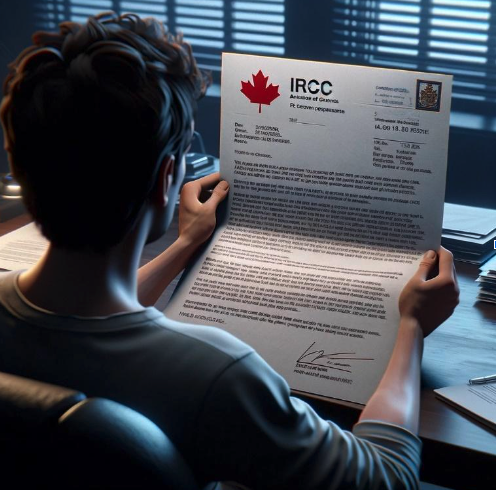Navigating Next Steps: What to Do After a Canadian Visa Refusal
Introduction
Receiving the disheartening news of a refused visa application, despite your best efforts, can be a demoralizing experience. However, rest assured, this setback is not the end of the road. In this insightful blog article, we will not only explore insightful post-refusal options but also shed light on your legal rights as an applicant following a Canadian visa refusal, including but not limited to study and work permits as well as temporary resident visas. Discover the pathways to overcome this obstacle and make informed decisions for your next steps.
In the following order, we will highlight your right and the importance of accessing your refusal’s reasons, and then present to you the three options available to you following a refusal: a second application, a reconsideration request, and an application for judicial review.
The right to your refusal’s reasons
Under Canadian law, applicants who have received a negative refusal have a right for the reasons for that refusal in order to better understand their situation (Baker v. Canada (Minister of Citizenship and Immigration), par. 43) This core principle of our laws applies to visa refusals as well.
While some refusal reasons may already be outlined in the letter from IRCC, such as concerns regarding the purpose of the visit, these reasons can often be vague and may not provide a comprehensive understanding of the decision.
GCMS notes
Visa officers who review visa applications document their decision-making process in the Global Case Management System (GCMS). Accessing your GCMS notes allows you to gain insight into how your application was evaluated and the specific reasons for refusal provided by the officer.
To obtain your GCMS notes, you can submit a request for access under the Privacy Act, which can be made online. At Canadian Future, our team of experts can assist you in obtaining, analyzing, and understanding the reasons of the refusal of your Canadian visa application.
The available options following a visa refusal
As previously discussed, there are three available options that are available to you after the refusal of your Canadian visa application by IRCC once you have obtained the GCMS notes: applying for a second time, making a reconsideration request, and applying for judicial review.
Second visa application
Your first option is to submit a second visa application. If, upon reading the officer’s notes, you identify problems with your application, you can reapply for the visa for which you were refused. However, you will need to pay the application fees for a second time and complete all the forms once again.
Understandably, that process can be frustrating, but it allows you to address the weak points that led to your refusal and strengthen your case. While not guaranteeing your acceptance, it can increase your chances to be issued a visa. At Canadian Future, we can assist you in applying for a Canadian visa with increased success chances with the expertise of our qualified team of immigration lawyers and consultants.
Reconsideration request
Your second option is to submit a reconsideration request. As the name indicates, it is a request for the visa officer to reconsider their decision and issue you a visa. Although the final decision rests with the officer, a well-prepared reconsideration request can potentially lead to a positive outcome.
The application for reconsideration is made via the IRCC Webform, in which you enter your file’s information, and submit the reasons for reconsideration as well as any additional documentation. You may then receive a response from IRCC indicating whether the refusal is maintained or whether your reconsideration request has been accepted. Our team at Canadian Future specializes in navigating visa refusals and can provide expert assistance with your reconsideration request.
Application for leave and judicial review (ALJR)
The third option at your disposal is to apply for judicial review. This mechanism in Canadian law allows Canadian courts to review and possibly overturn decisions made by visa officers. Immigration and visa applications are reviewed by the Federal Court of Canada. If you believe that there is a major error in the reasons for the refusal of your application, you may contest this decision through an application for leave and judicial review (ALJR) with the Federal Court.
An ALJR is an interesting option for applicants who are met with successive refusals. Through a Court decision or a legal settlement, the refusal decision is cancelled. Afterward, the file is reopened and analyzed by a different officer. There is no guarantee that the second officer will accept your application, however, your success chances are highly increased as the second officer will strive to avoid committing the same errors as the officer who issued the refusal.
In an ALJR, delays and court proceedings are of paramount importance. For instance, an ALJR may only be filed within 60 days of the receipt of the refusal decision by the applicant. Self-represented clients can submit ALJRs on their own, but the services of a lawyer allow you to entrust your case in the hands of a professional with knowledge and experience. Our legal team at Canadian Future has an established track record in helping clients transform their refusal letters into visas through successful applications for leave and judicial review.
Conclusion: What is the best option for me?
In immigration-related matters, there is no one-size-fits-all solution. Each refusal requires a personalized approach to determining the best course of action. Obtaining the officer’s notes is a critical first step in understanding the refusal.
Typically, applicants whose refusal decisions point out flaws or inconsistencies in their applications may choose to address these issues through a second application. However, reconsideration requests and applications for leave and judicial review (ALJRs) are viable options for individuals facing continuous refusals despite submitting high-quality applications.
If you find yourself unsure of how to proceed following a Canadian visa refusal or wish to gain a better understanding of the reasons behind the decision, we encourage you to schedule a consultation with our experienced team. We specialize in navigating visa refusals and can provide personalized guidance to help you chart the best path forward for your journey to Canada.
Legal Information Disclaimer
The information provided here is for general informational purposes only and should not be considered legal advice. The content on this site is not intended to create, nor does it constitute a lawyer-client relationship. It's important to consult with a qualified attorney for advice on your specific legal issues.
No responsibility is assumed for any reliance on the information contained herein, and Canadian Future disclaims all liability in respect to such information. This site may not reflect the most current legal developments; therefore, the information here should not be used as a substitute for legal advice from a licensed professional attorney in your jurisdiction.


Leave a comment